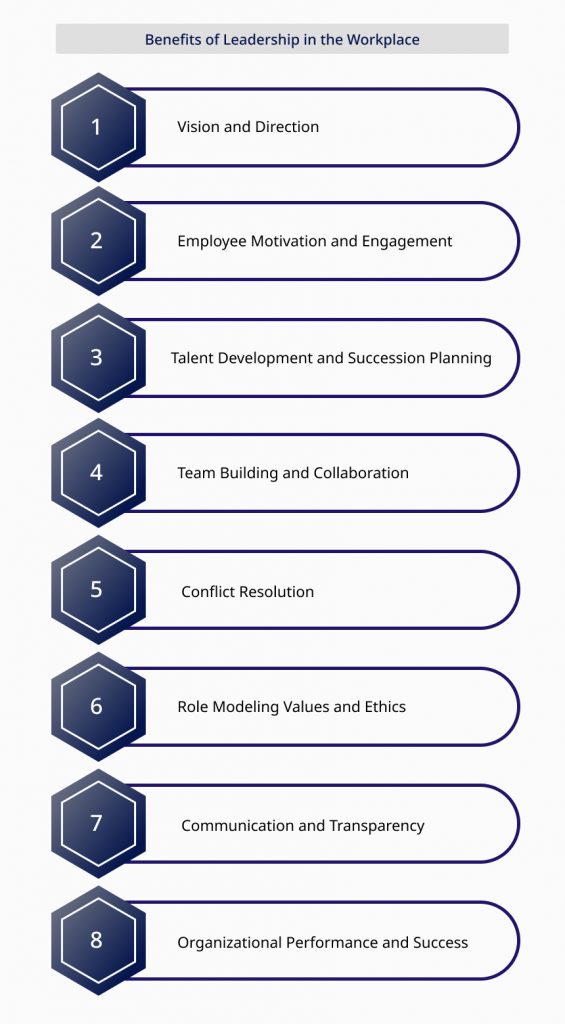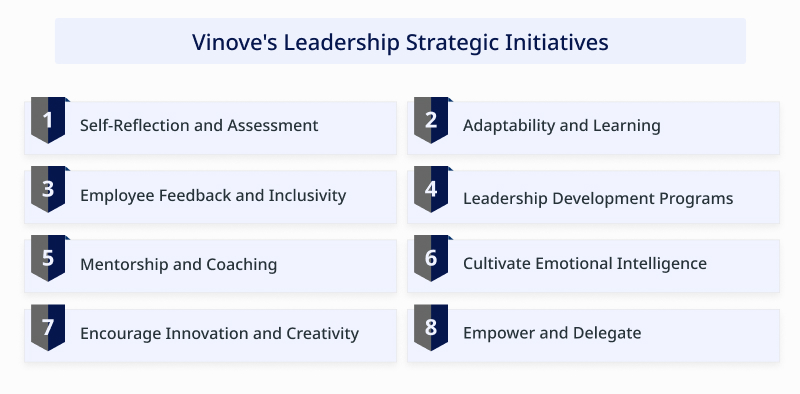Do you want to work for a company that values growth and innovation but feeling held back?
It’s frustrating when you see your company’s future headed in a direction you disagree with or worse, towards stagnation. You know you have great ideas and leadership skills to contribute, but your voice is never heard.
At Vinove, we believe in the importance of leadership to shape our company’s future. Read our blog to understand how Vinove’s leadership is shaping the leaders of tomorrow, providing opportunities for employees to grow their skills and take on leadership role, whether in management or simply leading a project.
Importance of Leadership in the Workplace
Leadership is significant in building an empowered workplace, influencing everything from individual motivation to overall organizational success. Here are some reasons why leadership skills are essential:
- Vision and Direction: Leadership ensures that everyone in the business knows the organization’s goals and works toward a common destiny by providing a clear vision and continuous learning in the workplace. A capable team is guided by a strategic vision that unites individual efforts with overarching company goals, creating a feeling of purpose.
- Employee Motivation and Engagement: The inspiring journey of leadership creates a stimulating work atmosphere. Employers are motivated and empowered by their leaders, who also foster a feeling of community and acknowledge their contributions. It results in more dedicated and continuous learning in tech teams and improved morale and job satisfaction.
- Talent Development and Succession Planning: Leadership’s role is to find and nurture talent inside the company. Proactive leaders invest in their team members’ development by allowing them to grow professionally and acquire new skills. Competent executives also participate in succession planning to guarantee a seamless handoff of duties and ongoing success.
- Team Building and Collaboration: Strong leadership greatly aids collaboration and the development of cohesive teams. Leaders foster an environment of mutual respect, trust, and open communication, which improves team dynamics. This collaborative environment enhances the team’s general effectiveness, creativity, and problem-solving skills.
- Conflict Resolution: Handling disagreements at work requires strong leadership. A competent leader seeks equitable and beneficial solutions to disputes as soon as they arise. Leaders encourage a culture of conflict resolution and open communication, which helps create a peaceful workplace.
- Role Modeling Values and Ethics: Executives set the standard for ethics and values inside their companies. Leaders who model and encourage moral behavior foster integrity and accountability. Building an empowered workplace with the trust of stakeholders and employees begins with consistently adhering to values.
- Communication and Transparency: Efficient leadership strongly emphasizes open communication. Leaders facilitate open communication, set clear expectations, and keep the team informed. Clear communication creates a positive workplace culture, decreases uncertainty, and increases trust.
- Organizational Performance and Success: Ultimately, the role of leadership greatly impacts an organization’s performance. Effective leaders set strategic priorities, adjust to shifting conditions, and guide the group toward success. Their leadership is essential for overcoming obstacles and guaranteeing long-term prosperity.
How has Vinove’s Leadership Style Evolved?
Vinove has evolved its leadership style through intentional efforts and a commitment to continuous improvement. Here are some strategies taken by Vinove to facilitate the evolution of leadership style for future leader professional development:
1. Self-Reflection and Assessment
Leaders who often reflect on and evaluate their leadership styles can help the organization change. We invest time in analyzing our leadership styles, methods, and areas of strength and weakness.
Through this reflective process, we pinpoint areas for development, hone their leadership approach, and adjust it to better suit the company’s changing demands.
Our leaders provide the groundwork for revolutionary improvements in their leadership style by admitting their prejudices and remaining receptive to personal development.
2. Adaptability and Learning
Adaptability is a crucial element in developing leadership philosophies inside an organization. We are open to change and look for new learning and growth opportunities.
Agile and responsive leadership is fostered by welcoming new ideas, remaining current on market trends, and adjusting to new obstacles.
Our leaders place a high value on lifelong learning, foster an innovative culture and guarantee that our leadership approach is still applicable and successful in changing corporate settings.
3. Employee Feedback and Inclusivity
A company’s leadership style can be improved by actively seeking employee input and demonstrating dedication to diversity.
Our organization fosters collaborative and inclusive environments to establish open channels of communication and pay attention to the opinions and worries of the team. Employee opinions offer insightful viewpoints on organizational dynamics and the efficacy of leadership.
By ensuring that different views are considered, inclusivity promotes a more flexible and well-rounded leadership style appealing to all workforce members.
4. Leadership Development Programs
One proactive strategy for changing organizational leadership philosophies is implementing structured future leaders’ professional development programs.
Through these programs, our executive network with other professionals to improve their abilities and remain current on industry best practices. We demonstrate our dedication to developing a pool of leaders capable of navigating changing difficulties by investing in leadership development.
These courses can address a variety of subjects, including strategic thinking, emotional intelligence, and communication skills, all of which help our leadership style become more adaptable and successful.
5. Mentorship and Coaching
Our organization uses a mentoring strategy to put much time and energy into helping their team members reach their full potential.
We foster professional progress by identifying strengths, addressing deficiencies, and offering tailored advice through one-on-one mentoring and assistance.
Our strategy creates a collaborative environment where workers feel appreciated and encouraged, which makes the workforce more talented and flexible.
By shifting from an entirely authoritative position to one of mentorship, we enable their teams to reach greater performance and personal growth goals.
6. Cultivate Emotional Intelligence
Developing emotional intelligence in leaders is a necessary step in evolving leadership style. Emotionally intelligent leaders can comprehend different points of view, empathize with team members, and effectively handle interpersonal dynamics.
This change to a more emotionally intelligent leadership style improves relationships, facilitates communication, and creates a happier work environment.
We establish a collaborative and respectful atmosphere, settle problems, and foster trust by acknowledging and managing their emotions and those of others.
7. Encourage Innovation and Creativity
Focusing on promoting creativity and innovation within the organization can propel the growth of leadership. Rejecting inflexible systems and embracing a culture that encourages innovation and experimentation are essential to modern leadership.
We cultivate an atmosphere that values innovation and enables our staff to think creatively and unconventionally.
This strategy fosters a culture of adaptation and constant improvement, putting the organization in a position to overcome obstacles and grab opportunities in a business environment that is changing quickly.
8. Empower and Delegate
A move toward effective delegation and empowerment is part of a growing leadership style. Employees who have their teams empowered feel more accountable and have a sense of ownership.
Our organization fosters a more dynamic and responsive business by appropriately delegating responsibility and placing faith in individuals to complete responsibilities.
This method not only assists in skill development for staff members but also frees our leaders to concentrate on long-term planning and strategic decision-making.
A more adaptable and durable organization equipped to handle the intricacies of the contemporary business environment is the result of empowerment and delegation.
Final Words: Impact on Guiding the Company Toward Future Successes
Ultimately, the evolving importance of leadership in the workplace has a profound impact on guiding the company toward future success.
Mentorship and coaching contribute to a skilled and motivated workforce, emotional intelligence enhances interpersonal relationships, encouraging innovation fosters adaptability, and empowering delegation creates a dynamic and efficient organizational structure to overcome tech workplace challenges.
This evolution in leadership aligns our company with contemporary business needs, positioning it to navigate challenges, embrace opportunities, and ultimately achieve sustained success in the ever-changing landscape.


